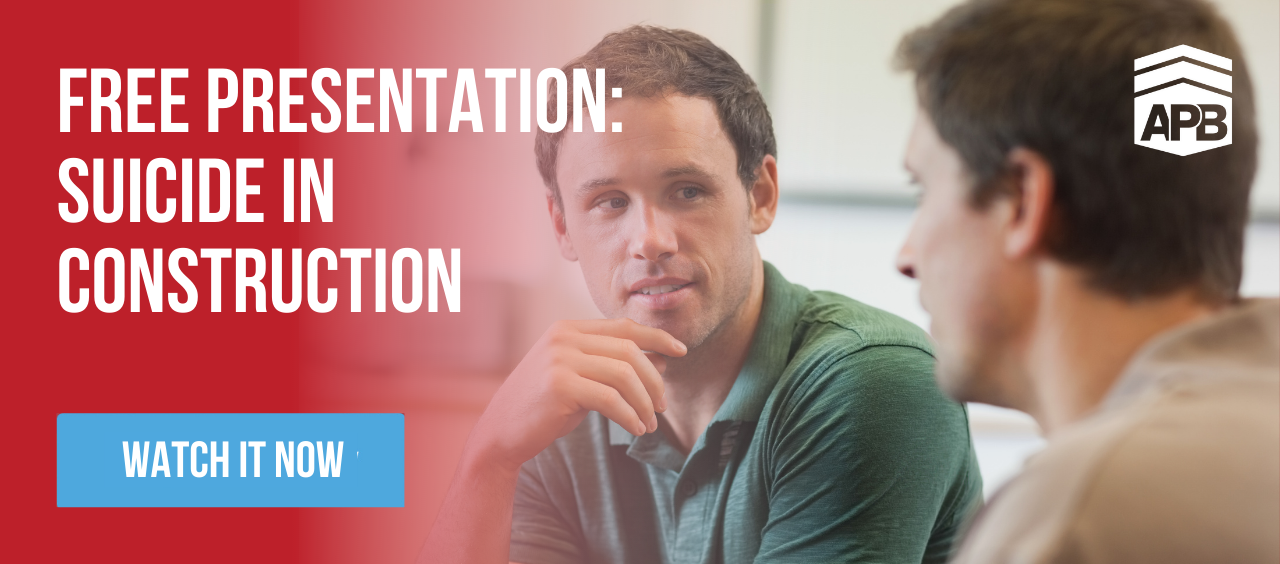Nine Australians die every day by suicide.
75% of those who take their own life are male.
Of those males, construction workers are 53% more likely to commit suicide than other employed males in Australia. (lifeline.com.au)
Too many Australians, predominantly males, are taking their life every year. Suicide has a devastating impact on families, friends and whole communities, and in most cases, it’s preventable.
And these numbers are not unique to Australia, similar figures have been reported in New Zealand, Canada and the United States.
The construction industry has been known to fall behind with identifying and preventing mental struggles due to the blokey nature and shame associated with asking for help, and has one of the highest rates of suicide amongst all industries globally.
It’s time for the industry to take action in providing a safe environment for construction workers to open dialogue around the issue of mental health and implement strategies to intervene when they see a mate who might be struggling.
The Association of Professional Builders recently held a panel discussion for our members on how to maintain mental toughness and build resilience during challenging and uncertain times.
Andy Skarda, Head Coach at APB, was joined by Nick Thompson from MATES In Construction to discuss strategies and tips for builders and construction workers on how to build mental resilience.
The team at MATES has been providing industry-backed, research-based, suicide prevention and support since 2008. These guys have provided training to more than 23,000 people since their inception.
Why Should We Pay Attention To Mental Health?
 Unfortunately, mental health in the construction industry is a matter of life or death. The construction industry is a male dominated industry and men have higher rates of suicide worldwide.
Unfortunately, mental health in the construction industry is a matter of life or death. The construction industry is a male dominated industry and men have higher rates of suicide worldwide.
In fact, men between the ages of 25 and 54 across the world, suicide is the second highest cause of death in that age group. And quite simply, the construction industry is the industry with the highest rates of male suicide in Australia and the United States.
In Australia, men in the construction industry are 53% more likely to die by suicide than other employed males in this country.
That's 190 construction workers a year. Meaning that a construction worker is lost to suicide every second day. This data is supported by a recent study commissioned by the University of Melbourne and Deakin University.
The reality is that even though the construction sector has very stringent health and safety regulations, death by suicide in this industry is six times higher than death due to site accidents, a recent study commissioned by MATES In Construction found.
This is not only the case for Australia. The United States and Canada are unfortunately showing similar statistics. The US Centre for Disease Control and Prevention, the CDC has said that the construction industry has the second highest rate of suicide in the country, 53.3 per 100,000 workers.
The similarity in numbers between Australia and the United States sadly indicates this is a crisis that is felt worldwide.
Why Are Mental Health Struggles So Prominent Amongst Construction Workers?
An undeniable cause of the highest suicide rate is unfortunately the stigma surrounding mental health in the industry and with men generally. The main driving factors that lead to suicide are that the sector is dominated by men and there is a stigma associated with talking about mental health.
Kayte Wilson, a MATES in construction case manager summarised this in the Australian context when she said, "In a male dominated culture, the she'll be right attitude plays a major part." (An Australian colloquialism that literally just means, don't worry about it. It'll be okay).
There is a stigma attached to men talking to other people about psychological stress and particularly their feelings if they're not coping.
The industry must accept that the blokey, tough guy culture is actually damaging to people's mental wellbeing and their safety because a lot of employees and team members do not feel comfortable discussing their mental health.
This often leaves employees in a place where they are ashamed for experiencing things like anxiety or distress, or having depressive and suicidal feelings.
This culture unfortunately contradicts the idea that is ingrained in us males that we, for some reason, should not be affected by our emotions.
Brad Parker, CEO of MATES in Construction New South Wales, said that one of the biggest issues was that 93% of construction workers who committed suicide never sought professional help. They either didn't know where to find it, didn't want to, or most worryingly, were not encouraged to.
Causal factors such as working long working hours, high pressure environments, male-dominated culture and all of the things that can make life at times really difficult, sadly means that people who work in this industry are considering death by suicide.
However there is help out there for all builders and their teams. So it’s important to understand the factors that play into mental struggles and explore what can be done to keep builders and their teams safe.
Strategies For Mental Toughness
Here are some strategies we uncovered throughout the discussion with MATES In Construction:

Awareness:
The team at MATES In Construction offer construction sites and building companies Awareness Training to highlight the alarming statistics and trends of mental struggles amongst construction workers to help people within this industry recognise that the problem exists.
Normalisation:
The next step in creating conversation around this topic and encouraging builders to take action towards building mental resilience is normalisation.
Normalising the fact that everybody in the world, not just in the construction industry at some point in their life is going to struggle or have a particular challenge, helps people feel less alone in their mental battles.
Warning signs:
Look out for the warning signs with your mates. If somebody does start to act differently, whether that's becoming more introverted or more extroverted, if it's outside of their normal pattern of behaviour, touch base with them and say, “Man, are you okay? This looks a bit different. I'm a bit worried about you. Are you okay? Are you having thoughts of suicide?”
Intervention:
One of the more challenging areas of implementing strategies for building mental resilience amongst the construction community is having to intervene. This involves actually intervening after a conversation where someone says, “Yes, I do have thoughts of suicide. Yes, I've got a plan and I'm thinking about doing this."
This is where it is important that people have the skills to say to them, “Okay, we need to get you to safety. We need to contact some support. I'm here with you. We're going to do this together. It's going to be okay.”
The intervention model relies on this being able to take place at a site level. So rather than experts coming in to try and solve the problem, it's about mates and colleagues looking out for those warning signs and then having a system and a structure to get them that help and that support.
The team at MATES In Construction hosts a training program called ASIST. This is Applied Suicide Intervention Skills Training. This is a world's best practice training that is essentially suicide prevention first aid.
When someone is seriously considering taking their life, this training teaches people the skills they need to create safety around that person. This includes talking to them about what's going on and then developing a plan by identifying turning points or the little lights of hope that might be happening deep down underneath all of the difficult things that are impacting them, honing in on those hopes and then creating a plan to get them to safety.
Impacts of COVID-19 On Mental Health
Nick Thompson, manager of industry engagement and client support with MATES in Construction, uncovered insightful information on the impacts of COVID-19 on mental health in the construction industry throughout the recent panel discussion.
He explained that in general, one in three community members, at some point, irrespective of construction, are going to have a mental challenge. It's part of the human condition. It's like getting any other kind of medical condition, at some point you can be impacted by a mental health challenge.
When it comes to COVID-19 at an anecdotal level, if people have pre-existing conditions, for example, a construction worker who has suffered significant anxiety and depression in their early twenties, they may find that the anxiety around COVID and the uncertainty of the future has exacerbated their dormant anxiety.
Meaning, a condition that was addressed a long time ago and treated by medical professionals, can flare up again because of the generalised anxiety that's happening at a global level due to COVID-19. It's not just Australia, it's not just within the local community. The uncertainty is being felt everywhere.
Additionally, although there has been a lot of investment into telehealth and into general practitioners being able to support people, it's very difficult to get an appointment because psychologists are booked out for months.
So while the support may be there, there's a lot of work to be done in improving some of those systems that can assist with preventing these mental flare ups.
By the same token, the economic uncertainty additionally adds a level of complexity to these mental struggles as the unpredictable nature of government restrictions and lockdowns means that financial instability becomes a worry for many builders and construction workers.
People are exceptionally worried about their economic future. And worry turns into anxiety. Anxiety and depression are co-morbid presentations for most people and so there is this broadening out of people who are really anxious and worried about the future.
To find out more about how to maintain mental toughness and build resilience during challenging and uncertain times, watch our FREE online presentation covering suicide in the construction industry and how you can help prevent it.
Click the button below to watch it free now.
Where To Go For Help
The positive news is that no one has to navigate these challenges alone. Organisations like MATES In Construction are leading the pack in driving awareness to the issue of mental health in the construction industry and are helping to remove the stigma around asking for and seeking help when it's needed.
Here are some resources that you can utilise instantly:
(Australia)
MATES 24 Hour Hotline: 1300 642 111
At any point, at any time, you can call this number and you'll have a trained, qualified staff member that can get you safety and support.
Contact MATES for more information about their training programs:
info@mates.org.au
If you need to speak with someone about the state of your mental health or are having suicidal thoughts, please dial one of the numbers below based on your region:
AU: Lifeline 13 11 14 or Beyond Blue 1300 22 4636
US: National Suicide Prevention Lifeline 1-800-273-8255
CA: Canada Suicide Prevention Service 1-833-456-4566 or 45645
NZ: Lifeline 09 5222 999
UK: UK National Suicide Prevention Helpline 0800 689 5652.
Rest of the world
If you are in need of an emergency, please dial the number below based on your region:
AU: 000
US/CA: 911
NZ: 111
UK: 999 or 112
Rest of the world


.jpg)

